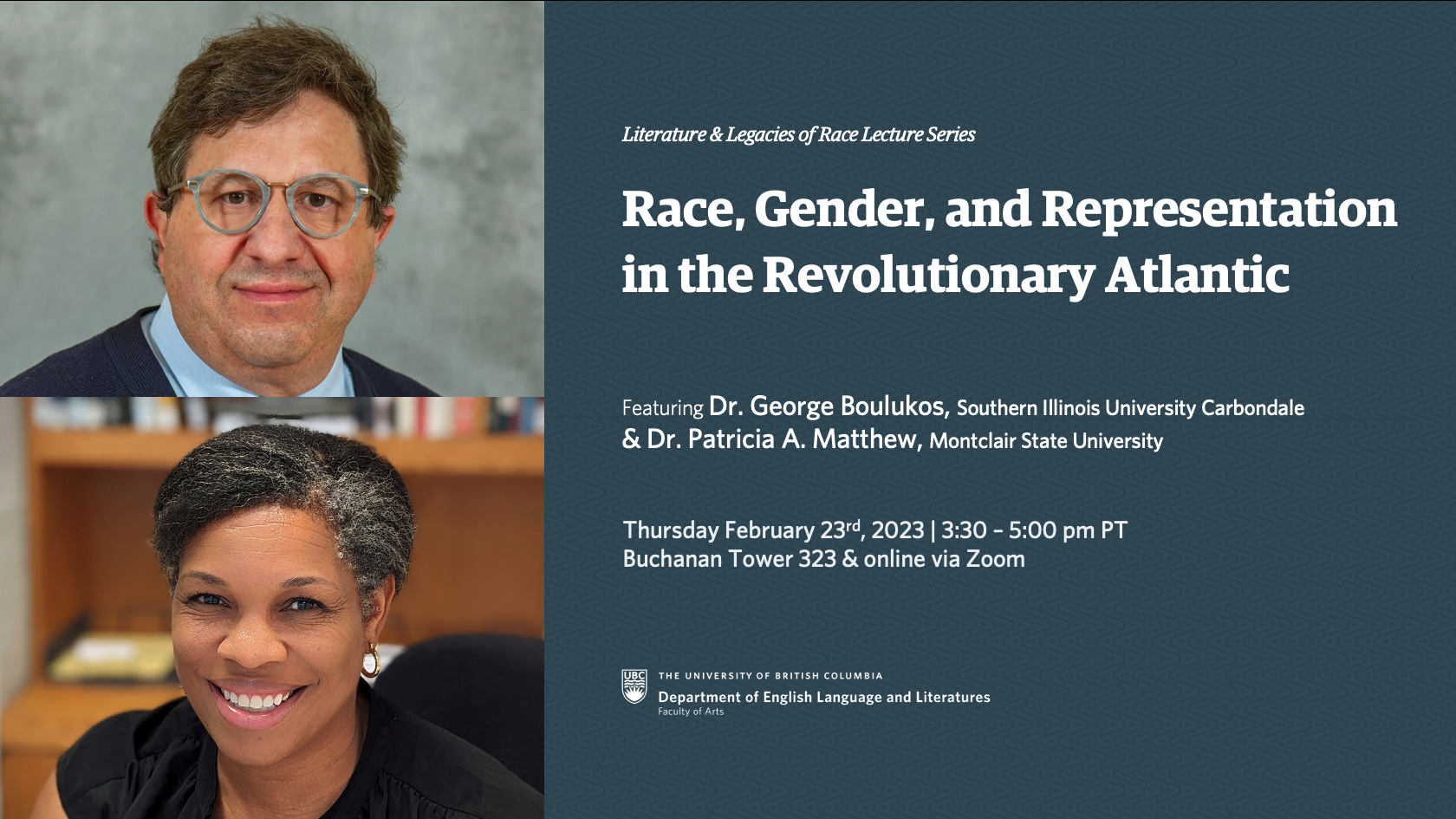

The Department of English Language & Literatures is pleased to invite you to the third event of the Literature & Legacies of Race lecture series, organized by Dr. Dennis Austin Britton. In this series, leading scholars will help us consider how histories of racism, colonialism, and slavery have shaped cultural imaginations at different historical moments.
While previous Literature & Legacies of Race events feature one speaker per event, “Race, Gender, and Representation in the Revolutionary Atlantic” is fortunate to centre engaging talks by two brilliant scholars, Dr. Patricia Matthew (Montclair State University) and Dr. George Boulukos (Southern Illinois University Carbondale).
All lectures in this series can be attended virtually via Zoom or in person at the UBC Point Grey campus, situated on the unceded, ancestral, and traditional territory of the xʷməθkʷəy̓əm (Musqueam). Whether you plan to attend virtually or in-person, please register for the event using the link below.
Talk Abstracts
“‘The Young Catechist’: Blackness, Performance, and Visual Narratives of Benevolence” by Patricia Matthew
This talk takes as its subject two portraits of Black men, one produced in the final years of Britain’s abolitionist movement and a contemporary painting that reimagines race and eighteenth and nineteenth-century masculinities. Both paintings reflect the intricacies of genre, race, and power that are key to understanding how Britain’s abolitionist projects constructed Blackness as a philanthropic category. The paintings are objects where literary forms and aesthetic categories coalesce in the service of narratives designed to concretize hierarchies still in place today.
Art historians have shown that the presence of black figures in eighteenth and nineteenth- century portraits and genre paintings not only tell us about British culture’s global encounters, but also function as a barometer for the various ways that wealthy Britons signaled power. When paintings that include Black figures depict performances of charity, they reveal something else—a particularly gendered matrix that represents a key moment in feminist history. Britain’s abolitionist project is one of the first public causes around which white women organized themselves. And, alongside their benevolent desires, they understood that abolitionist organizing was a path to power and influence. These portraits are a testimony to that complicated dynamic. They show how white women were depicted as ameliorative figures while Britons faced the threats of abolition and emancipation and how that visualization turned philanthropy into a property of white womanhood.
“Clarissa After Haiti: Rape, Revolution, and the Origins of Metropolitan White Supremacy” by George Boulukos
Abbe Raynal, in an early edition of the History of the Two Indies invokes Samuel Richardson’s heroine, Clarissa, to elucidate his view of slaves’ rights. Raynal criticizes Clarissa’s defending herself against Lovelace with a threat of suicide, arguing that slaves should stab their masters because “the death of a criminal is more conformable to justice than that of an innocent person.” Still, Clarissa’s ultimate fate – dying to validate her virtue – echoes, unintentionally, Raynal’s underlying view of rebel slaves. They must rebel for liberty; but when they rebel, they must be killed to preserve society. As Jay Fliegelman has documented, Clarissa also served to justify American colonists’ filial rebellion against a parent nation that failed to respect their autonomy. But Clarissa, furthermore, comes to symbolize the threat to white colonists posed by rebel slaves. Propagandists for West Indian planters, most influentially Bryan Edwards, promoted a view of the Haitian Revolution as a race war characterized rebels’ genocidal fixation on murdering white children and raping white women. This propaganda was shockingly successful, leading formerly radical novelists to promote a white supremacist view of slave uprisings as genocidal race wars and to challenge their readers to choose sides. Charlotte Smith, for instance, in The Letters of Henrietta, reimagines Clarissa in a Jamaican setting, as the story of a white woman, who escapes from her tyrannical planter father, only to find her virtue imperilled by slaves and maroons intent on sexual violence against her.
Speaker Biography
Patricia A. Matthew (she/her/hers) is associate professor of English at Montclair State University where she teaches courses on British Romanticism, the history of the novel, and British abolitionist literature. She is the co-editor of a special issue of Romantic Pedagogy Commons, a cluster issue in European Romantic Review, and editor of a special Studies in Romanticism issue “Race, Blackness, and Romanticism.” She has published essays and reviews in Women’s Writing, Nineteenth-Century Gender Studies, the Keats-Shelley Journal, and Texas Studies in Literature and Language and written about race, portraiture, and British abolitionist material culture for The Atlantic and Lapham’s Quarterly. Matthew is the editor of Written/Unwritten: Diversity and the Hidden Truths of Tenure (University of North Carolina Press, 2016) and has published essays and book reviews on diversity in higher education in PMLA, The College Language Association Journal, Signs: Journal of Women in Culture and Society, and The New Inquiry. She has written about race and television for The Los Angeles Review of Books and The Times Literary Supplement. Matthew is co-editor of Oxford University Press’s new series Race in Nineteenth-Century Literature and Culture and will edit Mansfield Park for W.W. Norton. She was a 2020-2021 Center for Diversity Innovation Distinguished Visiting Scholar at the University at Buffalo and currently holds the Anthony E, Kaye Fellowship at the National Humanities Center. Her monograph about sugar, gender, and British abolitionist culture is under advance contract with Princeton University Press.
George Boulukos (he/him/his), Professor of English at Southern Illinois University Carbondale, is the author of The Grateful Slave (Cambridge UP, 2008) and the editor of the never-before-published memoir by an eighteenth-century stableboy, Memoirs on the Life and Travels of Thomas Hammond 1775-1782 (University of Virginia Press, 2017). His current project, A Vindication of the Rights of Monsters, challenges received histories of human rights, arguing that the Enlightenment discourse of “the rights of man” held that slaves forfeited their rights if they did not rise up against slavery, but also enjoined that rebel slaves must be killed.

